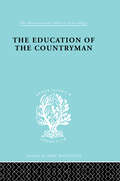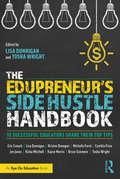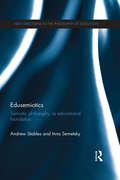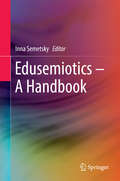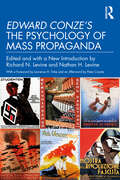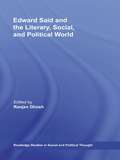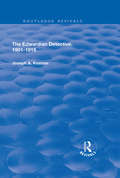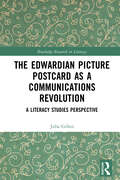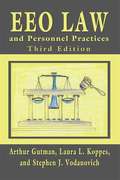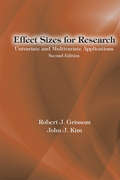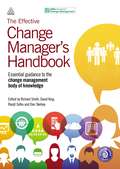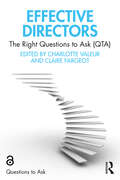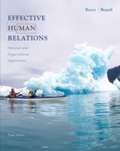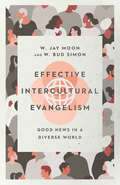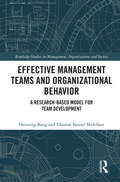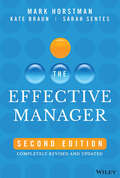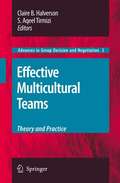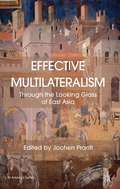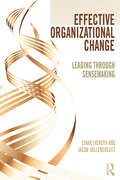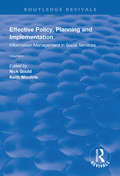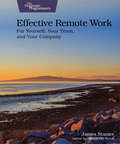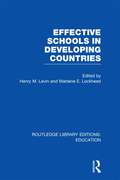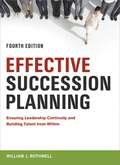- Table View
- List View
Eductn Of Countryman Ils 224 (International Library of Sociology)
by Harry McGuire BurtonFirst Published in 1998. Routledge is an imprint of Taylor & Francis, an informa company.
The Edupreneur's Side Hustle Handbook: 10 Successful Educators Share Their Top Tips
by Lisa Dunnigan Tosha WrightFind out how you can use your talents as an educator to make extra money on the side! In this helpful book, top Instagram influencers share how they’ve had success with selling lesson plans, handouts, t-shirts, and more, while maintaining careers as teachers and school leaders. You’ll hear from these inspiring educators: Lisa Dunnigan and Tosha Wright @thewrightstuffchics Jen Jones @hellojenjones Michelle Ferré @pocketfulofprimary Kisha Mitchell @sweetteaandsunshinepodcast Bryce Sizemore @theteachingtexan Kristen Donegan @easyteachingtools Cynthia Frias @followsocialone Kayse Morris @kaysemorris Eric Crouch @adventureswithmrc If you’ve always dreamed of having a side hustle but weren’t sure you had the time or the know-how, this is the book for you. Each chapter offers tons of practical tips to help you get started, along with humorous anecdotes and words of wisdom to keep you motivated on your journey.
Edusemiotics: Semiotic philosophy as educational foundation (New Directions in the Philosophy of Education #64)
by Inna Semetsky Andrew StablesEdusemiotics addresses an emerging field of inquiry, educational semiotics, as a philosophy of and for education. Using "sign" as a unit of analysis, educational semiotics amalgamates philosophy, educational theory and semiotics. Edusemiotics draws on the intellectual legacy of such philosophers as John Dewey, Charles Sanders Peirce, Gilles Deleuze and others across Anglo-American and continental traditions. This volume investigates the specifics of semiotic knowledge structures and processes, exploring current dilemmas and debates regarding self-identity, learning, transformative and lifelong education, leadership and policy-making, and interrogating an important premise that still haunts contemporary educational philosophy: Cartesian dualism. In defiance of substance dualism and the fragmentation of knowledge that still inform education, the book offers a unifying paradigm for education as edusemiotics and emphasises ethical education in compliance with the semiotic unity between knowledge and action. Chapters contain accessible discussions in the context of educational philosophy and theory, crossing the borders between logic, art, and science together with a provocative theoretical critique. Recently awarded a PESA book award for its contribution to the philosophy of education, Edusemiotics will appeal to an academic readership in education, philosophy and cultural studies, while also being an inspiring resource for students.
Edusemiotics – A Handbook
by Inna SemetskyEdusemiotics is a pioneering area of study that connects semiotics - the science of signs - with educational theory and the philosophy of education. This volume reflects cutting-edge research by scholars in education and in semiotics worldwide, bridging the two discourses to present the state of the art in this new transdisciplinary field. The book's emphasis is on educational theory as based on semiotic philosophy: as such, it challenges the current conception of semiotics in education as merely a sub-branch of applied semiotics. It presents edusemiotics as a novel unified conceptual framework at the interface of theoretical semiotics and educational philosophy, based on both theoretical and empirical studies from around the world. The chapters in this handbook also bring to the fore the intellectual legacy of Charles S. Peirce, John Dewey, Gilles Deleuze, Umberto Eco, Julia Kristeva, Mikhail Bakhtin, Paul Ricoeur, Martin Heidegger and other thinkers, pointing out the implications of edusemiotics for meaningful pedagogy and experiential learning in diverse contexts.
Edward Conze's The Psychology of Mass Propaganda
by Richard N. Levine Nathan H. LevineEdward Conze’s The Psychology of Mass Propaganda presents a commentary on the psychology of propaganda during the rise of fascism in Europe in the 1930s. It discusses the conditions which generate vulnerability to misinformation in human societies, and thus offers insight into how propaganda may be "withstood." Completed in 1939, during the period of Conze’s own inflection from Marxist philosophy to Buddhist studies, the original manuscript was never published and is now in print for the first time. Presenting a unique historical perspective, while also appealing to an acutely topical interest in the conditions under which autocracy and fascism arise, the book examines the psychology of mass propaganda through copious contemporary and historical examples. Conze focuses especially on recent news articles and the statements of the propagandists of many of the governments that would go on to participate in the Second World War, including Germany, Italy, the USSR, USA and UK, all of which he interprets through the lens of recent psychological and historical research. The book has been edited and includes a new introduction by Richard N. Levine and Nathan H. Levine, also featuring a foreword by American legal scholar Laurence H. Tribe, and an afterword by actor, director, writer, and Buddhist priest Peter Coyote. This is a fascinating opportunity for scholars across several disciplines, including political scientists and psychologists, historians and sociologists, to access one of Conze’s previously unpublished works. It will also be of importance to those interested in Conze’s work on Buddhist philosophy, and in the psychology of propaganda more broadly.
Edward Said and the Literary, Social, and Political World (Routledge Studies in Social and Political Thought)
by Ranjan GhoshEdward Said is widely recognized for his work as a critic and theorist of Orientalism and the Palestine crisis, but far less attention has been devoted to his considerable body of literary and cultural criticism. In this edited collection, the contributors - many among the foremost Said scholars in the world - examine Said as the literary critic; his relationship to other major contemporary thinkers (including Derrida, Ricoeur, Barthes and Bloom); and his involvement with major movements and concerns of his time (such as music, Feminism, New Humanism, and Marxism). Featuring freshly carved out essays on new areas of intervention, the volume is an indispensable addition for those interested in Edward Said and the many areas in which his legacy looms.
The Edwardian Detective: 1901-15 (Routledge Revivals)
by Professor Joseph KestnerThis title was first published in 1999 & examines the range of detective literature produced between 1901 and 1915 in Britain, during the reign of Edward VII and the early reign of George V. The book assesses the literature as cultural history, with a focus on issues such as legal reform, marital reform, surveillance, Germanophobia, masculinity/femininity, the "best-seller", the arms race, international diplomacy and the concept of "popular" literature. The work also addresses specific issues related to the relationship of law to literature, such as: the law in literature; the law as literature, the role of literature in surveillance and policing; the interpretation of legal issues by literature; the degree to which literature describes and interprets law; the description of legal processes in detective literature; and the connections between detective literature and cultural practices and transitions.
Edwardian England and the Idea of Racial Decline: An Empire’s Future
by Christopher PriorEmerging from a long and exhausting conflict against the Boers in South Africa, Edwardians are often perceived as rocked by a profound set of doubts about the future of the British Empire. Drawing upon a wide range of popular sources, this study considers the level of middle-class engagement with such strains of pessimistic thought.
The Edwardian Picture Postcard as a Communications Revolution: A Literacy Studies Perspective (Routledge Research in Literacy)
by Julia GillenThis monograph offers a novel investigation of the Edwardian picture postcard as an innovative form of multimodal communication, revealing much about the creativity, concerns and lives of those who used postcards as an almost instantaneous form of communication. In the early twentieth century, the picture postcard was a revolutionary way of combining short messages with an image, making use of technologies in a way impossible in the decades since, until the advent of the digital revolution. This book offers original insights into the historical and social context in which the Edwardian picture postcard emerged and became a craze. It also expands the field of Literacy Studies by illustrating the combined use of posthuman, multimodal, historic and linguistic methodologies to conduct an in-depth analysis of the communicative, sociolinguistic and relational functions of the postcard. Particular attention is paid to how study of the picture postcard can reveal details of the lives and literacy practices of often overlooked sectors of the population, such as working-class women. The Edwardian era in the United Kingdom was one of extreme inequalities and rapid social change, and picture postcards embodied the dynamism of the times. Grounded in an analysis of a unique, open access, digitized collection of 3,000 picture postcards, this monograph will be of interest to researchers and postgraduate students in the fields of Literacy Studies, sociolinguistics, history of communications and UK social history.
EEO Law and Personnel Practices
by Arthur Gutman Laura L. Koppes Stephen J. VodanovichThe goal of this well known book is to provide methods for understanding major EEO laws, including the Civil Rights Act of 1964, the Equal Pay Act of 1963, and the American with Disabilities Act of 1990. Also included are over 700 cases involving federal case law that focus on issues relating to the terms and conditions of employment. New to this t
Eerste hulp bij praktijkgericht onderzoek: Een handleiding voor hbo-studenten in de gezondheidszorg
by Jaap Brunnekreef Joost SeegerDit boek is hét handboek voor elke hbo-student die praktijkgericht onderzoek doet binnen de gezondheidszorg en extra hulp kan gebruiken. Stapsgewijs word je meegenomen door het onderzoeksproces. Aan de hand van het boek blijf je op koers en werk je aan betekenisvol onderzoek, met daadwerkelijke impact op de beroepspraktijk. Eerste hulp bij praktijkgericht onderzoek is opgebouwd aan de hand van de vijf fases van de onderzoekscyclus. Achtereenvolgens worden de probleemanalyse, het onderzoeksdesign, de dataverzameling, de data-analyse en het rapporteren behandeld. Wie het boek leest tijdens het doen van zijn onderzoek, weet daardoor altijd op tijd wat de volgende stap moet zijn. Alle belangrijke thema’s komen aan bod, van wetgeving tot het schrijven van een goed artikel en het kiezen van het juiste onderzoeksdesign. Het boek is no-nonsense, biedt gerichte handvatten om direct toe te passen, is makkelijk leesbaar en aangevuld met online kennisclips. Kortom dit boek is een musthave voor elke HBO-student die wel wat extra hulp kan gebruiken bij het uitvoeren van het praktijkgerichte onderzoek. De auteurs zijn beiden als docent verbonden aan de Hogeschool van Arnhem en Nijmegen en werkzaam voor de Academie Paramedische studies. .
Effect Sizes for Research: Univariate and Multivariate Applications, Second Edition
by Robert J. Grissom John J. KimNoted for its comprehensive coverage, this greatly expanded new edition now covers the use of univariate and multivariate effect sizes. Many measures and estimators are reviewed along with their application, interpretation, and limitations. Noted for its practical approach, the book features numerous examples using real data for a variety of variables and designs, to help readers apply the material to their own data. Tips on the use of SPSS, SAS, R, and S-Plus are provided. The book's broad disciplinary appeal results from its inclusion of a variety of examples from psychology, medicine, education, and other social sciences. Special attention is paid to confidence intervals, the statistical assumptions of the methods, and robust estimators of effect sizes. The extensive reference section is appreciated by all. With more than 40% new material, highlights of the new editon include: three new multivariate chapters covering effect sizes for analysis of covariance, multiple regression/correlation, and multivariate analysis of variance more learning tools in each chapter including introductions, summaries, "Tips and Pitfalls" and more conceptual and computational questions more coverage of univariate effect sizes, confidence intervals, and effect sizes for repeated measures to reflect their increased use in research more software references for calculating effect sizes and their confidence intervals including SPSS, SAS, R, and S-Plus the data used in the book are now provided on the web along with new data and suggested calculations with IBM SPSS syntax for computational practice. Effect Sizes for Research covers standardized and unstandardized differences between means, correlational measures, strength of association, and parametric and nonparametric measures for between- and within-groups data. Intended as a resource for professionals, researchers, and advanced students in a variety of fields, this book is also an excellent supplement for advanced statistics courses in psychology, education, the social sciences, business, and medicine. A prerequisite of introductory statistics through factorial analysis of variance and chi-square is recommended.
The Effective Change Manager's Handbook
by Richard Smith Apmg Dan Skelsey Ranjit Sidhu David KingThe change management profession is no longer in its infancy. Readily identifiable in organizations and in business literature it is no longer reliant on parent disciplines such as organizational development or project management. Change management is itself in a state of change and growth - the number of jobs is increasing and organizations are actively seeking to build their change management capability. The Effective Change Manager's Handbook, the official guide to the CMI Body of Knowledge, is explicitly designed to help practitioners, employers and academics define and practice change management successfully and to develop change management maturity within their organization. A single-volume learning resource covering the range of underpinning knowledge required, it includes chapters from esteemed and established thought leaders on topics ranging from benefits management, stakeholder strategy, facilitation, change readiness, project management and education and learning support. Covering the whole process from planning to implementation, it offers practical tools, techniques and models to effectively support any change initiative.
Effective Directors: The Right Questions to Ask (QTA) (Questions to Ask (QTA))
by Charlotte ValeurThe ebook will be Open Access and made available on publication. Being a good board member is not about knowing everything; it is about asking the right questions and challenging appropriately. Effective Directors: The Right Questions To Ask (QTA) is a reference book for board members and executives globally to support them in their work. With chapters written by senior company board members and respected figures in corporate governance, the questions have been drawn together to offer food for thought and useful prompts that take boards beyond operational discussions. The book clearly presents key areas to be considered by the board (there are over 50 in total) and range from board composition, to data security, diversity and inclusion, and succession planning. The questions are ones that boards, in any organisation, should be asking themselves, their fellow board members, service providers, executives, and other stakeholders to ensure that the right issues are raised, transparency and effective oversight are achieved, and the board is fulfilling its role in governing the organisation. In addition to being invaluable for board members, the book is also a very useful tool for executives in understanding the kind of questions their board members are likely to ask, and the kind of questions that should be asked and discussed in the boardroom.
Effective Human Relations: Personal and Organizational Applications
by Barry L. Reece Rhonda BrandtThis comprehensive text covers the key human relation skills students need to be successful managers in the workplace. Ideal for both two- and four-year programs, Effective Human Relations uses an organizational perspective to help students understand the disparate factors that influence employee behavior. The Tenth Edition focuses more directly on chapter objectives, establishing them around the seven themes of the text--communication, self-awareness, self-acceptance, motivation, trust, self-disclosure, and conflict resolution--so that the students absorb and connect the concepts. New areas of coverage include goal-setting principles; root causes of negative attitudes; introduction of the Reiss Profile instrument used to classify our basic desires; the use of "branding" to achieve greater visibility in a crowded job market; discrimination based on a person's religious preference; new ways to classify various forms of technostress; and new support for the importance of emotional intelligence. Throughout the text, major themes are supported by a multitude of real-world examples and emotional intelligence checkpoints.
Effective Intercultural Evangelism: Good News in a Diverse World
by W. Jay Moon W. Bud SimonWe live in a multicultural society. But Christians often do not know how to engage those of other faiths. As a result, many Christians hesitate to talk about Christianity with others in any kind of evangelistic way. Jay Moon and Bud Simon unpack the intercultural dynamics that Christians need to understand when encountering people from different communities and cultural backgrounds. Regarding evangelism from the perspective of four major worldviews (guilt/justice, shame/honor, fear/power, and indifference/belonging with purpose), this book demonstrates contextual evangelism approaches that are relevant, biblical, and practical. The authors draw on new research conducted with hundreds of participants that reveal concrete ways to communicate the gospel effectively across cultures. Sharing one's faith does not require attacking other religions; rather, we can engage at the worldview level in order to address people's deepest concerns. Greater understanding provides us with better skills for relational connection, empathy, and effective witness.
Effective Management Teams and Organizational Behavior: A Research-Based Model for Team Development (Routledge Studies in Management, Organizations and Society)
by Henning Bang Thomas Nesset MidelfartMost contemporary organizations use management teams to manage and coordinate their businesses at all levels of the organizational hierarchy. Management teams typically set overall goals, strategies, and priorities, making vital organizational decisions. They discuss issues, solve problems, offer advice, and ensure various processes and units are aligned and interact efficiently. Although management teams are vital for overall organizational performance, research indicates that they are largely underused and less effective than their potential would suggest for value creation. This book provides a research-based and practical model of the characteristics of effective management teams. It looks in depth at each factor of the model, discusses the supporting research, provides examples of how the factors influence the work and effectiveness of management teams, and shares tips and tools for successfully working with management team development. It provides researchers, academics, and students of organizational behavior with an overview of the variables that empirical research has found to be robustly related to management team effectiveness and will enable leaders and management consultants to develop more effective management teams.
The Effective Manager
by Mark Horstman Kate Braun Sarah SentesAn essential resource for managers at every level of any organization A management book written by managers for front-line managers, The Effective Manager, 2nd edition, is a concise, practical, and incisive take on what to do and say to get the best results possible from your co-located or remotely distributed team. The book's concrete advice will improve your relationships with your team members, increase your chances of being promoted, and generate trust amongst those you lead. You'll learn why managing remote teams is so much harder than managing one in a single location and how to meet that challenge head-on. You'll also discover how to introduce your ideas to your team, counter their concerns and pushback, and ensure your instructions are followed. In the place of vague bromides about being "impactful" or "candid," you'll get hands-on guidance on how to behave in the situations that managers find themselves in on a daily basis. The authors also offer: Data- and evidence-driven advice that's been proven to work in the real world over the last 30 years Ground-level, real-world tips on getting the best work out of your team without burning them out Four critical manager behaviors that build success: Know your people, talk about performance, ask for more, and push work down A book for every manager at every level, The Effective Manager shows you what you can do now, today, with your team members to improve their performance, increase personnel retention, and get better results.
Effective Multicultural Teams: Theory and Practice
by Claire B. Halverson S. Aqeel TirmiziMulticultural and multinational teams have become an important strategic and structural element of organizational work in our globalized world today. These teams are demonstrating their importance from the factory floors to the boardrooms of contemporary organizations. The emergence of multicultural teams is evident across a variety of organizations in the private, public, and civil society sectors. These developments have led to an increasing interest in the theory and practice of multicultural teams. Management educational and training programs are giving increasing attention to these developments. At the same time, there is emerging interest in research about and study of multicultural teams. This book emerged from our teaching, research, and consulting with multicultural and diverse teams in multiple sectors over the last several years. In particular, we have developed and refined our ideas about the concepts in this book from teaching an advanced course called Effective Multicultural Teams in the Graduate Program at the School for International Training (SIT) in Vermont. We have learned from the rich background of students who are from, and have worked in, six contents, and who are, or plan to be, working in the public, educational, not-for-profit, and for-profit sectors. Additionally, we have engaged with a variety of teams through our consulting and training, providing consultation to teams in a variety of sectors and continents as they struggled to become more effective.
Effective Multilateralism
by Jochen PrantlExisting theories of cooperation assume a stable geo-political order, led by countries with a shared conception of the modalities of cooperation. These assumptions are no longer justified. Effective Multilateralism makes the case for a new approach to explaining international cooperation through the lens of East Asian.
Effective Organizational Change: Leading Through Sensemaking
by Einar Iveroth Jacob HallencreutzOrganizations are constantly evolving, and intelligent leadership is needed during times of transformation. Change leaders must help people become aware of, understand and find meaning in the new things which arise — they must oversee a sensemaking process. Addressing this need, Effective Organizational Change explores the importance of leadership for organizational change based on sensemaking. Combining a theoretical overview, models and conceptual discussions rich with in-depth examples and case studies, this book uncovers what it is that leaders actually do when they lead change through sensemaking. It presents the most current sensemaking research, extends earlier work by developing the concept of ‘landscaping’, and provides guidelines on how leaders can drive sensemaking processes in practice. This book is for undergraduate, postgraduate and MBA students of organizational change, as well as managers embarking on change projects within their organizations.
Effective Policy, Planning and Implementation: Volume 2: Information Management in Social Services (Routledge Revivals)
by Nick Gould Keith MoultrieFirst published in 1997, in this second volume Gould and Moultrie compile writings from various professionals in the public service sector, researchers and other academics in support of the Social Services Research and Development Unit (or SSRADU) at the University of Bath. Primarily focusing on three points of research: In retrospect, the lessons learnt form implementing information systems in to address specific needs of the social service organisation. Different processes that can successfully identify the major information needs of the late 1990s, encompassing efficient and relevant information to inform social service planning. Finally, the management of information in social services in a national and international context.
Effective Remote Work: For Yourself, Your Team, And Your Company
by Dr James StanierThe office isn't as essential as it used to be. Flexible working hours and distributed teams are replacing decades of on-site, open-plan office culture. Wherever you work from nowadays, your colleagues are likely to be somewhere else. No more whiteboards. No more water coolers. And certainly no Ping-Pong. So how can you organize yourself, ship software, communicate, and be impactful as part of a globally distributed workforce? We'll show you how. It's time to adopt a brand new mindset. Remote working is here to stay. Come and join us. Remote working is on the rise. Whether or not we are remote workers, it is likely we are all part of a global workforce. We need to learn to interact remotely, because we are all remote from someone in some way. Rather than simply simulating the way we'd usually work together via digital means, we have to learn new communication skills and adopt a different mindset in order to work remotely effectively, efficiently, and, most importantly, healthily.We'll start by getting you set up with the right equipment and habits. Then, we'll learn the mindset of treating everyone as remote, and conquer both synchronous and asynchronous communication. You'll learn how to produce amazing artifacts, how to communicate clearly, and how to manage yourself and your teams. Then we'll look at the bigger picture: from measuring the remote readiness of your workplace, to creating a handbook for your team, to exploring remote-first culture and tackling burnout and mental well-being.Fundamentally we'll see that adopting a remote-working mindset can do wonders for our organization, our effectiveness, and our impact in our careers. It can even create a more diverse and inclusive industry for us all to work in.So what are you waiting for? The remote future is now. Be a part of it.What You Need:There are no prerequisites to reading this book, other than having had some experience of working in the software industry and a healthy curiosity.
Effective Schools in Developing Countries (Routledge Library Editions: Education #Vol. 15)
by Henry M. LevinThis volume brings together eight case studies which describe a variety of initiatives to create more effective schools for children of poverty, especially in the Third World. The initiatives reviewed published and unpublished documents and both qualitative and statistical studies were examined. Countries include Brazil, Burundi, Colombia, Ghana, Nepal, Sri Lanka, Thailand and the United States. Each initiative was developed independently to address unique challenges and situations but taken as a group, the features of the approaches described in this volume can be viewed as a basis for considering the development of effective schools strategies in other contexts.
Effective Succession Planning: Ensuring Leadership Continuity and Building Talent from Within
by William RothwellWilliam Rothwell honored with the ASTD Distinguished Contribution Award in Workplace Learning and Performance. The definitive guide to a timely and timeless topic-- now fully revised and updated. As baby boomers continue to retire en masse from executive suites, managerial offices, and specialized or technical jobs, the question is—who will take their places? This loss of valuable institutional memory has made it apparent that no organization can afford to be without a strong succession program. <P><P>Now in its fourth edition, Effective Succession Planning provides the tools organizations need to establish, revitalize, or revise their own succession planning and management (SP&M) programs. The book has been fully updated to address challenges brought on by sea changes such as globalization, recession, technology, and the aftereffects of the terror attacks. It features new sections on identifying and assessing competencies and future needs; management vs. technical succession planning; and ethics and conduct; and new chapters on integrating recruitment and retention strategies with succession planning programs. This edition incorporates the results of two extensive new surveys, and includes a Quick Start guide to help begin immediate implementation as well as a CD-ROM packed with assessments, checklists, customizable guides, and other practical tools.
